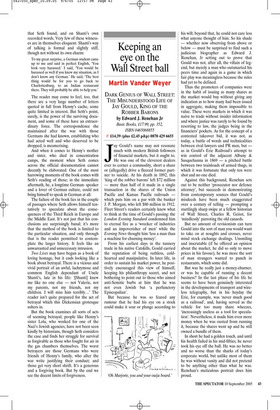Keeping an eye on the Wall Street ball
Martin Vander Weyer
DARK GENIUS OF WALL STREET: THE MISUNDERSTOOD LIFE OF JAY GOULD, KING OF THE ROBBER BARONS by Edward J. Renehan Jr Basic Books, £17.99, pp. 352, ISBN 0465068855 ✆ £14.39 (plus £2.45 p&p) 0870 429 6655 Jay Gould’s name may not resonate much with modern British followers of financial markets, but it ought to. He was one of the cleverest dealers ever to corner a commodity, short a share or (allegedly) drive a fleeced former partner to suicide. At his death in 1892, this ‘king of the robber barons’ left $72 million — more than half of it made in a single transaction in the shares of the Union Pacific and Kansas Pacific railroads which puts him on a par with the banker J. P. Morgan, who left $80 million in 1912. Fleet Street’s readers certainly knew what to think at the time of Gould’s passing: the London Evening Standard condemned him to eternal fire as a ‘wrecker of industries and an impoverisher of men’ while the Evening News thought him ‘less a man than a machine for churning money’.
From his earliest days in the tannery trade in his native Catskills, Gould carried the reputation of being ruthless, coldhearted and manipulative. In later life, in order to sustain his market power, he positively encouraged this view of himself, keeping his philanthropy secret, and not bothering to point out to those who aimed anti-Semitic barbs at him that he was not even Jewish but ‘a perfunctory Episcopalian’.
But because he was so feared any rumour that he had his eye on a stock could make it soar or plunge according to his will; beyond that, he could not care less what anyone thought of him. So his shade — whether now observing from above or below — must be surprised to find such a judicious biographer as Edward J. Renehan, Jr setting out to prove that Gould was not, after all, the villain of legend, but merely a man who outsmarted his peers time and again in a game in which fair play was meaningless because the rules had yet to be defined.
Thus the promoters of companies were in the habit of issuing as many shares as the market would buy without giving any indication as to how many had been issued in aggregate, making them impossible to value. These were markets in which it was naive to trade without insider information and where justice was rarely to be found by resorting to law, the judges being in the financiers’ pockets. As for the concept of a contested takeover bid, it was not, as today, a battle of words and technicalities between rival lawyers and PR men, but as in Gould’s Erie Railroad’s attempt to win control of the adjacent Albany & Susquehanna in 1869 — a pitched battle between two trainloads of armed thugs, in which it was fortunate that only ten were shot and no one died.
Against this background, Renehan sets out to be neither ‘prosecutor nor defence attorney’, but succeeds in demonstrating from contemporary sources that Gould’s misdeeds have been much exaggerated over a century of telling — prompting a startlingly sharp swipe at a fellow historian of Wall Street, Charles R. Geisst, for ‘mindlessly’ parroting the old canards.
But no amount of revisionism can turn Gould into the sort of man you would want to take on at noughts and crosses, never mind stock exchange dealings. Unsmiling and inscrutable (if he offered an opinion about the market, he did so only to move prices in his favour), he was more the sort of man strangers wanted to punch in restaurants, which some did.
But was he really just a money-churner, or was he capable of running a decent business? In the last phase of his life he seems to have been genuinely interested in the developments of transport and wireless telegraphy, but in his heyday the Erie, for example, was ‘never much good as a railroad’, and, having served as the vehicle for too many share wheezes, ‘increasingly useless as a tool for speculation’. Nevertheless, it made him even more money when he was ousted from running it, because the shares went up and he still owned a bundle of them.
In short he had a golden touch, and until his health failed in his mid-fifties, he never took his eye off the ball. He was no better and no worse than the sharks of today’s corporate world, but unlike most of them he was without vanity and did not pretend to be anything other than what he was. Renehan’s meticulous portrait does him proud.
























































 Previous page
Previous page